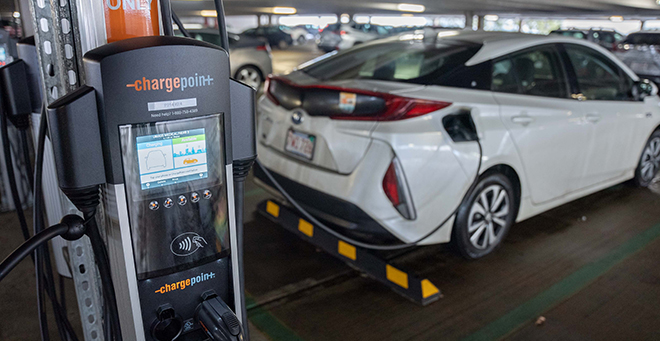UMass Chan installs 32 electric vehicle charging ports, supported by National Grid
UMass Chan Medical School has installed 32 electric vehicle charging ports, with support from National Grid as part of the company’s Electric Vehicle Charging Station Program, which aims to expand EV adoption, accelerate usage and lower the cost of installation of EV chargers.
The 16 dual-port level 2 stations were installed in the UMass Chan West parking garage, which is used by employees of the Medical School and UMass Memorial Medical Center.

The cost of installation, totaling more than $320,000, was funded, in part, by National Grid’s EV Charging Station Program shortly after the stations were activated in December. National Grid provided a rebate of more than $230,000.
The program was started in early 2019 to encourage businesses and facilities to enable easier EV charging. National Grid reimburses up to 100 percent of the cost of the electrical infrastructure and helps fund the cost of level 2 station hardware. Customers choose from a menu of eligible equipment that can be refunded.
“We recently launched one of the largest EV programs in the country outside of California, with a target to install 30,000 EV charging station ports in New England and New York by 2025,” said John Isberg, vice president of customer solutions at National Grid. “The EV Charging Station Program helps businesses and facilities enable the transition to electrified transportation and helps places like UMass Chan Medical School cover the costs of new charging stations. We applaud UMass Chan’s commitment to encouraging EVs and we’re proud to partner with the school on this project.”
"We are thankful for the support from National Grid on this important program to expand EV charging capacity on campus,” said Suzanne Wood, associate director of facilities management for sustainability and campus services at UMass Chan Medical School. “Increasing the use of electric vehicles, both in our own fleet and by the members of our community who drive to campus, is a specific goal of our sustainability plan. Having charging stations available on campus can be a powerful incentive for people to consider transitioning to an electric vehicle.”
UMass Chan has had a formalized sustainability and energy-efficiency program since 2004. In 2020, the school received a Leading by Example award from the Massachusetts Executive Office of Energy and Environmental Affairs in recognition of a wide range of initiatives, including designing new buildings to LEED standards, supporting off-site solar electrical generation, promoting electric vehicle use, and completing HVAC, plumbing, electrical and lighting improvement projects that have reduced energy use, saved potable water and reduced greenhouse gas emissions. Several of these projects were also supported with incentives from National Grid.
Transportation is the single biggest cause of greenhouse gas emissions in Massachusetts at 43 percent and the expansion of EV use is a feasible route to help Massachusetts become net-zero by 2050.